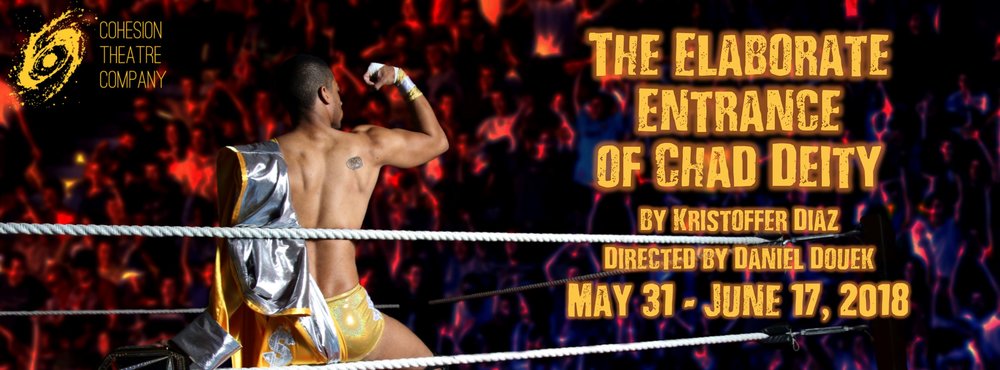- Chad Deity is extremely muscular. Tim German has guns for miles.
- Chad Deity has a winning smile. Tim German exercises it liberally all show long.
- The Elaborate Entrance of Chad Deity is a mind-blowing, surefire knockout theatrical experience happening in Baltimore right now. Cohesion Theatre Company has it on their stage as we speak.
What else could you possibly need to know about the facts of Chad Deity? Other than, you can’t kick a guy’s ass without the help of the guy whose ass you’re trying to kick. And that this production of The Elaborate Entrance of Chad Deity is directed by Daniel Douek and well worth seeing during its brief three-weekend run. Heavyweight theatrical material with poignant political potency, this OBIE award-winning play by Kristoffer Diaz offers a proper story with deep American roots as well as a healthy dose of roaring satire, all of which is focused through the lens of Pro-Wrestling.
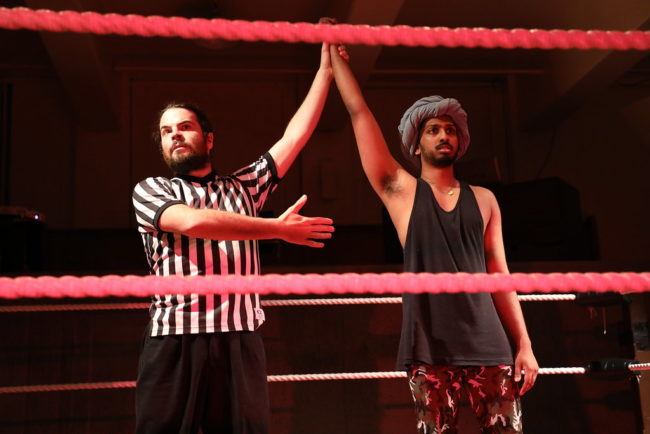
With special thanks given to Renaissance Rumble, Scenic Designer Michael Rasinski sets the real-life wrestling ring right down in the center of the action, and in typical Cohesion style, frames the house seating around said action. Every seat is ringside, up close and personal for this theatrical encounter. Making full use of the unique setup at The Fallout Shelter, Rasinski sets EKO up on the elevated platform for most of his scene work and even carves a grand dramatic entrance ramp between the Jumbo Tron-style screens that sit behind the ring. The downfall with the entrance being placed amid the screens is that at times a few of the projections and video work have slight distortions in their visibility. This aside, Rasinski’s work is on point for the show.
The aforementioned videos, created by Jehan Sterling Silva, fall in sync with the work of Lighting and Projection Designer Serafina Donahue. During the various “entrances”, because by the end of the show, nearly everyone seems to be embracing an elaborate entrance of some fashion, Donahue’s work is most keenly experienced. All of the intentionally exacerbated stereotypes that Kristoffer Diaz has jammed into the script find visual purchase inside these projections and inside Silva’s video creations. The combination is quite striking, really driving home the bigger picture of the text, showing audiences just how primed the American brain is when it comes to expecting, accepting, and regrettably welcoming stereotypes. These Jumbo Tron segments are accompanied by the musical compositions of Navid Azeez and Ryan Buell, both who do a fine job of matching the aural soundscape to the visual imagery being displayed.
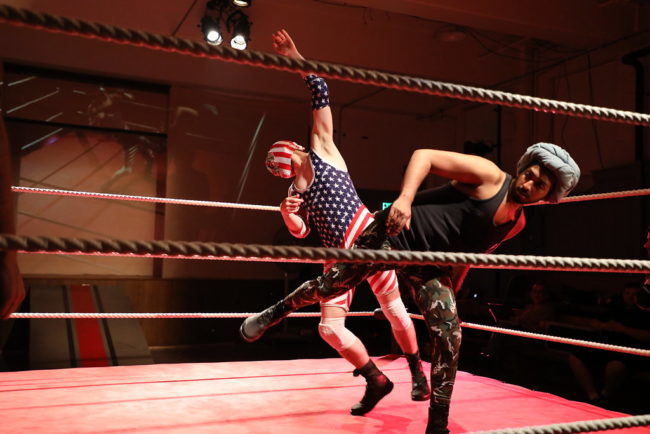
Giving Chad Deity that extra sparkle, Costume Designer Helenmary Ball fuses together two of America’s great loves: pro-wrestling and money. The shimmer gold spandex wrestling shorts, and long, shiny gold trainer paints adorned with sparkling dollar signs are just two of Ball’s successes in this production, which features a deep look at what American society deems important. All of Ball’s flash and bling, especially for the other wrestlers, looks mighty fine when being put to use in the ring, thanks to Pro-Wrestling Trainer Joseph Grasso and Fight Choreographer Jonathan Ezra Rubin. The signature moves, like “The Power Bomb” and “The Sleeper Cell” are enacted with extreme caution, so as not to hurt the actors, but look painstakingly authentic, really grabbing the attention of the audience, especially when the bodies pound down onto the wrestling ring floor.
Director Daniel Douek finds a surefire path to the heart of the story. It’s easy to get caught up in the spectacle of the show the way Kristoffer Diaz has penned it, in fact there is a “blind them with razzle dazzle” element that permeates a good portion of the plot’s progression but this does not stop Douek from guiding his actors to engage with the script and the deeper meaning of the story wholeheartedly. There is an honest air and pulsating authenticity that comes from the narrative moments, most readily experienced with Mace and occasionally with V.P., that seizes the audience and draws them into the story as it unfolds. Though at times, again predominantly with Mace, the actors trail off ever so slightly, forgetting that they still need to project their voices in this most intimate storytelling endeavor, the emotional connection to the tale never wavers and always springs forth from a place of raw and earnest truth.
Though only in the production long enough to perform his character’s namesake’s duties, Matthew Casella delivers a firm performance as the Referee. Stern in the ring, with a big bold voice, Casella is impartial and keeps the audience engaged in the full wrestling experience by delivering a little explanatory speech of how to cheer and be excited at a wrestling match. Equally brief in his various appearances, though making great comedy in each of his three roles, Fred Fletcher-Jackson— who plays Bad Guy, Billy Heartland, and Old Glory— creates quite the stir and the show in the ring, especially when facing off against V.P.
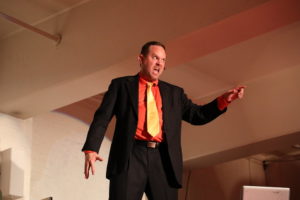
Parading like a caricature cartoon of infamous pro-wrestling puppeteers, Jason Hentrich as E.K.O. delivers a monstrously obnoxious and abrasive performance, which hones in with laser-sharp precision on the stock character of the enterprising tycoon. Hentrich is wildly animated, particularly in his facial expressions, but also vocally, and creates bombastic moments that both funny and appalling, setting you right on the edge of your seat. Mind the eviscerating blades of blunt and blatant racism peppered liberally throughout the script, but especially those that fly from E.K.O.’s mouth, as it’s the blow you never see coming that will truly knock you out.
Playwright Kristoffer Diaz has painted an extraordinary picture of the way racism and racial stereotypes still presently dominate forms of media entertainment in today’s world in this work, and what’s more is the vulgar and unsettling display of how the minority groups discriminated against in those slurs and stereotypes, simply accept it and in certain arenas— like the pro-wrestling circuit— embrace it to make a living or to live the dream. Handling material like this is no cakewalk and the three front runners of the show do an exemplary job of carrying off the strikingly potent and powerfully relevant nature that Diaz has presented in this story.
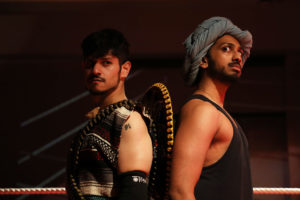
V.P. (Jehan Sterling Silva) speaks with the smooth sleekness of the streets, regardless whose streets, there is this perpetual burble of urban savviness that defines his character, regardless which language that character is speaking. Silva composes the character with extraordinary confidence. When delivering one of V.P.’s final statements, asking why is it okay to live outside of themselves for money or the sake of the dream and how do they then go back to wherever they call home and look kids of their culture in the eye and explain what they did, Silva delivers this wish such a jaw-dropping intensity and striking sense of truth that it draws tears to the eye and draws great attention to the overarching theme presented in the show. Why do groups of minorities, ostracized groups, groups discriminating against and stereotyped accept the vilification of their stereotype in order to live the dream? It’s a potent moment well handled in the hands of Silva.
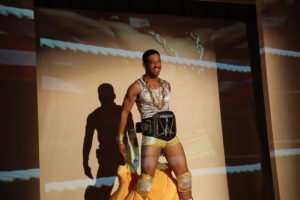
Having already discussed the rules of Chad Deity, it is perhaps time to discuss the performance of Chad Deity (Tim German.) Dragging out charisma for miles, German creates the all-American hero inside the titular character that everyone is hoping for. With the perfect physique for the part, the cheesy grin well locked in place, and the flashy, showy egotism that goes along with such a personality, it’s easy to believe that German plays the character on the surface, but this is simply not the case. There is a moment, late in the second act when a frightened and daringly humane side of Chad Deity surfaces, even just for an instant, in Mace’s defense, but it is a marvel to see in juxtaposition to the shimmery glitz of a veneer that German has presented in Chad Deity up to that point.
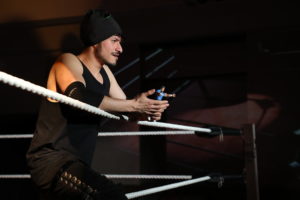
But really, really, Mace (Christian Gonzalez) is the ring-leader in this pack of wrestling figures. It’s Mace’s story; it’s Mace’s life. Gonzalez is the perfect pick for the role, handling the emotional weight and heft of the narrative delivery with great authenticity. There are little moments of humor peppered into Gonzalez’s performance that reminds us, despite the character’s plight, he’s still human, still has hope, and still has light in his soul. Drawing us readily into Mace’s tale, Gonzalez is an instant winner when it comes to connecting the empathies and sympathies of the protagonist with the audience and does so without an ounce of artifice or even really a hint of struggle. Everything flows freely from Gonzalez’s mouth, as if they were his own words, and not the story of a character in a play. When he finally hits the climactic explosion that the play spends its entirety building up to, Gonzales delivers this moment with ferocious intensity and emotional fortitude, granting the audience the desperate cathartic release they’ve been craving from the moment they meet Mace.
Grab your ring-side seat, bring your cheering voice (and possibly a tissue or two) and let’s get ready to RUUUUUUMMMMMBLLLLLEEEEEE— at Cohesion Theatre’s production of The Elaborate Entrance of Chad Deity.
Running Time: 2 hours with one intermission
The Elaborate Entrance of Chad Deity plays through June 17, 2018 at Cohesion Theatre Company in the Fallout Shelter of the United Evangelical Church— 923 S. East Street in the Canton neighborhood of Baltimore, MD. Tickets are available at the door or in advance online.

